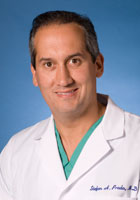 Stefan Prada, MD, an orthopedic spine surgeon at Laser Spine Institute in Tampa, Fla., discusses four current and emerging issues that are affecting spine surgeons. 1. Minimally invasive surgery and the outpatient setting. Minimally invasive surgery is transforming the landscape of spine. A field once almost exclusively the realm of hospitals is beginning to change. "With decompression and minimally invasive solutions, surgery leads to less postoperative pain. With these smaller incisions and shorter recovery times, there is now a move towards the ASC and outpatient setting," says Dr. Prada.
Stefan Prada, MD, an orthopedic spine surgeon at Laser Spine Institute in Tampa, Fla., discusses four current and emerging issues that are affecting spine surgeons. 1. Minimally invasive surgery and the outpatient setting. Minimally invasive surgery is transforming the landscape of spine. A field once almost exclusively the realm of hospitals is beginning to change. "With decompression and minimally invasive solutions, surgery leads to less postoperative pain. With these smaller incisions and shorter recovery times, there is now a move towards the ASC and outpatient setting," says Dr. Prada. Spine surgeons are experiencing success with anterior cervical (ACDF) and lumbar (TLIF) procedures done in the outpatient setting. Elderly patients that were once turned away because of the invasive, stressful nature of spine surgery are now being safely treated in an outpatient environment and quickly returning to a life of improved quality.
"The trend will be slow, but continuing. Some surgeries will always be performed as an open procedure, but technology continues to reduce the size of incisions," says Dr. Prada. Arthroscopy was initially scoffed at, but now surgeons hardly even consider open knee surgery. This same trend will drive spine continually forward into the world of minimally invasive and outpatient surgery.
2. Postoperative care of patients. Minimally invasive surgery results in less pain and a quicker recovery, but patients often believe that a quick recovery means an instant recovery. They can then do too much too soon and negate the positive effects of a procedure.
"Try to be proactive and help patients recover in the safest way possible," says Dr. Prada. Patients should be given printed postoperative instructions. Send routine emails and spend time on follow up calls during recovery to remind them of what they can and cannot do. Laser Spine Institute has a 24 hour 'spine line,' a phone number that patients can use to reach a nurse or physician assistant at anytime. Laser Spine Institute follows up with patients one, two, six and twelve weeks post surgery.
3. Keeping up with technology. Equipment and technology have rapidly evolved to meet the demands of minimally invasive surgery. Incisions are minimal; working tools and endoscopic cameras are growing smaller to fit the needs of surgery today. "Working tubes began at 22mm, but now have shrunk to 14mm or even 7mm," says Dr. Prada. Innovation in instrumentation is appearing at a rapid rate. Spine surgeons are challenged to be skilled in the use of the latest technology to enhance patient treatment and recovery.
4. Growing concern of obesity. "One of the most important issues facing our nation and all physicians is the growing problem of obesity. It is detrimental to the body, spine and ability to move," says Dr. Prada. Prior to the advent of regularly performed minimally invasive surgery, many obese patients were turned away. Larger patients required a much more invasive surgery in terms of traditional techniques. Now, minimally invasive surgery needs only to use a longer instrument inserted through an incision that does not change the nature of the surgery.
Dr. Prada stresses the need to discuss the problem of obesity with patients. "After we have helped obese patients with an incapacitating problem, the seed has been planted in their mind. They need to address the issue," says Dr. Prada. At Laser Spine Institute, obese patients receive the necessary information for weight loss and a healthier lifestyle after surgery. Laser Spine Institute follows up with patients up to two years after surgery to determine how patients are progressing. Patients should engage in aerobic and core conditioning after surgery to work towards maintaining a healthy body weight.
More Articles on Spine:
Innovative Biomaterial Potentially Reduces Infection Rates in Spinal Fusion Surgery
Advocating for Patient Access & Surgeon Needs: Q&A With Dr. Eric Truumees of Seton Spine and Scoliosis Center
6 Spine Surgeons on Healthcare Reform Challenges


